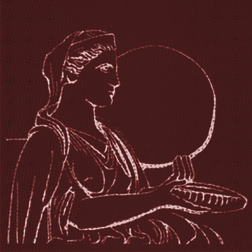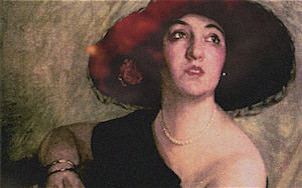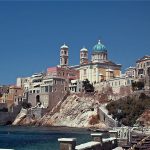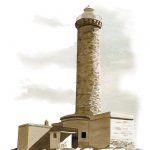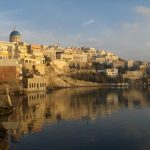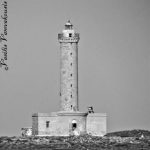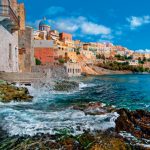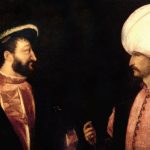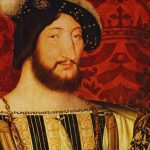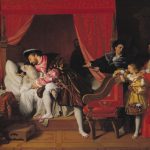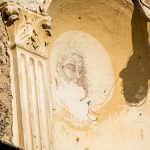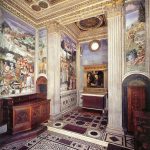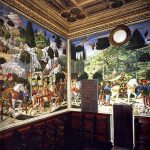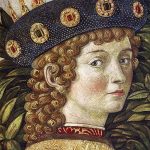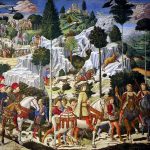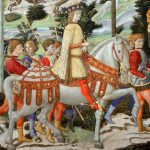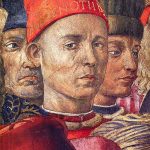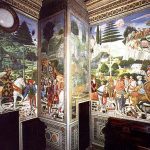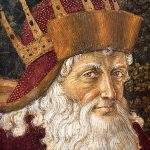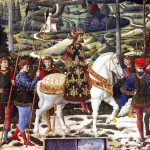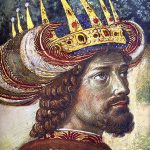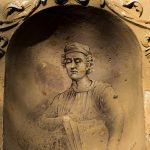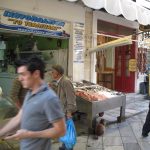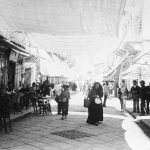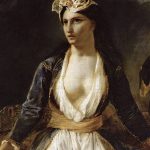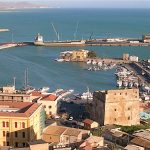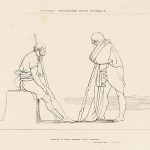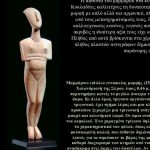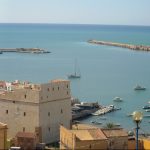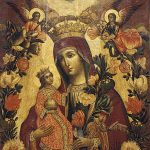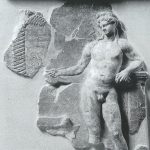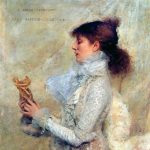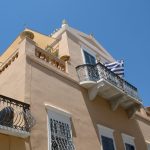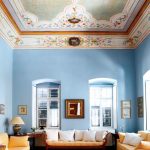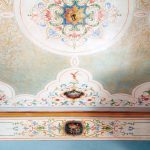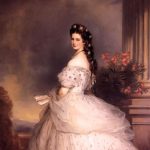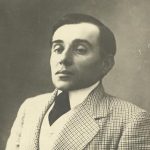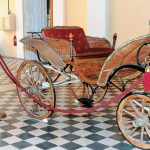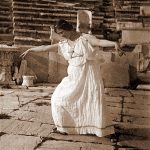Phantasmagoria
Welcome to a ghost world, a world that loves old theatre, voiceless photographs, letters of silence, love letters.
The gods and ghosts of the past are all around us.
Suddenly Kotopouli (1) kisses Apollo of Delos (1) on the mouth and he transforms into a gray-haired sailor who lures her on to the little beach Katergaki (2) and gets her drunk with the excellent Fabrika wine. Myrat (2) stumbles and follows Hermes. Myrat is sunk into debt and is looking on the internet for a loan. Panas appears on the screen and tells him to invest in cheese instead of gold and so they make forth to an old Ano Meria (3) creamery. The cheese is the true gold.
The gods are present in everything surrounding us.
Under a fig tree, primeval Kyveli reminisces over her last love while eating sweets of honey and sesame. There, saint Glykeria, the saint of sweet delights, approaches her. The aromas of mastic from Chios and wild flowers linger in the air around them. They leave for the spring of Saint Thanasis (4), they drink water. Standing beside the spring is a tall handsome man from Ano Syros, baptised “Doctor Ineotis” by the psychiatrist Cheimonas. They all pray to the waters. They create a troop with new material because the god Dionysus wants technology, even though he is a toothless drunk, who asks for all the coastal district of Vaporia (5) in exchange for an “empty shirt” and two rebetika songs….
They have to go to the Town Hall (6). Standing at the peristyle is Ziller (3) painting Aphrodite’s sparrows and the pigeons with gold. He soliloquises: “How can you trust a people who baptised the most serious of theatre, the Tragedy, after the billy goat (in Greek tragos)?” From the top of the lighthouse (7) Erlacher (4) replies to him: “But was it not the goat (in Greek aega) that baptised Aegeus and this sea the Aegean Sea?”…
So what is missing at this moment in time from both you and us? That which is missing is your indiscretion regarding our loneliness. The ancient estrus lifts the curtain…
And here we go.
Ano Syros
Why is it that I feel ecstatic every time I stand on this hill that Vamvakaris (5) used to call the “Rock” (8)?
I look up to the medieval church of St George, a monument full of spiritual meaning. I look down the sloping hill where I see a few remaining sheep with their slightly agitating bells.
I am ecstatic with this almost wedding like view: the tight embrace between the white city and the Rock, creating a beautifully balanced view full of spirit and orderliness. Everything is formulated and structured with precision and economy.
I meet up with Maria and Katerina. We look at the Aegean Sea. The big Theatre where many acts of piracy have taken place through the centuries. Capitulations were based on economics of trade and protection of ships.
In the early 16th century François Premier (6), the king of France, signed with Suleiman the Magnificent the first agreement ever made between a European country and the Ottoman Empire. The two rulers never met in person and the agreement was made through ambassadors and contracts of great diplomatic intellect.
And so … who took this photograph?
But Platon Rivellis (7) of course, who, since his childhood, dreamt of the Amaranto (9).
François Premier gave one of his towers to Leonardo da Vinci, so that he could live out the rest of his life in serenity. The painter Jean-Auguste-Dominique Ingres (8) created a painting where the king is kissing Leonardo’s wrinkled forehead, the same forehead as is depicted on the half erased painting on the house belonging to Proios, but without the kiss and forever fading…
Benozzo Gozzoli
I am standing beneath a pepper tree chewing some red peppercorns outside the house (10) of the 19th century merchant Stamatios Proios (9), a Greek benefactor of the nation from the island of Chios. In a niche within the stone-built external wall, there is a painting of a man. I read his name. He is the Florentine Benozzo Gozzoli (10). He was the one who painted the fresco “Le cortège des rois mages” (The Journey of the Magi to Bethlehem) at the Palazzo Medici Ricardi of Florence incorporating within the religious theme members of the Medici family and a number of important people of the Byzantine era that arrived in Florence for the Council of Ferrara in 1439. Depicted within the big procession on gold adorned horses are the Patriarch of Constantinople and John VIII Palaeologus, both adorned with crowns. The stones were perhaps fake jewels, as was written by Cavafy (Greek poet, journalist and civil servant), possibly made from coloured glass. However the gifts of the Byzantines towards the West designated the Renaissance. Wonders of the Greek spirit, such as the works of Plato, form an anthology of our Church Fathers’ secrets from past centuries, and together with the numerous mosaics and wonderful objects crafted from silver are a testament of rare wisdom and art.
The Churches did not unite. They coexist and stand majestically here on Syros. A rare experience for the traveler.
In between the two hills is Odessa, Marseilles, Trieste, Alexandria – the home of Cavafy and of course Venice with the Tethrippon of Lysippos on St Mark’s Basilica, brought from the hippodrome of Constantinople.
Vrontado
On the top of Vrontado (11), the hill of the Orthodox Christians, there is a church dedicated to the Resurrection of Christ (Resurrection in Greek is Anastasi) and at the same time it symbolises the Resurrection of the Nation after the Massacre of Chios in 1822.
I have a weakness for this church because Anastasios was the name of the poor shoemaker who found in his humble courtyard my great grandmother Kyveli (11), as an abandoned infant. He raised her with an abundance of love, as if she were his own child.
I like to descend the slope of the hill using a particular path of steps that lead me to the courtyard of the Kyveli Institute (12). To the left and to the right of the path and on the vertical streets leading uphill and downhill there are homes built with a lot of hard work by the persecuted sailors and craftsmen of Chios. From the inside of Dimitriano’s small house Mozart’s Requiem can be heard. The basset horn was Mozart’s favorite instrument but it was also the pseudonym of George Bernard Shaw, who wrote about that pure soul, Joan of Arc, who was burned at the stake because she heard bells and voices.
As I gaze beyond into the distance I see Panorama, the most beautiful natural balcony of Syros, located opposite the ruins of Lazareta (13). It was here that Kairis (12) a Greek priest, philosopher and revolutionary who also heard voices was buried in a pit and covered in lime. Before his death Kairis travelled throughout Europe and while in Rome he often sat at the Campo de’ Fiori gazing at the statue of Giordano Bruno who was burned at the stake because he looked to the planets in the sky. The painter of icons Andrei Rublev was also burned to death in Russia with boiling oil, having first been wrapped with thin white gauze intended as the medium in order for the boiling oil to have the maximum effect…
The majestic staircase of Vrontado continues down to the main Market of Hermoupolis (14) on Chios street where one may find fresh fish, vegetables, fruit, sun-dried tomatoes as well as sun-dried figs with sesame. The greengrocer Giannakopoulos is breaking with a hammer some green olives from this year’s crop. As he sits on his stool striking the hammer he resembles the President of the Court of The Hague sitting -I’m told- in his seat, a copy of the throne from the Palace of Minos, the king of Crete. During my visits to the market I adore the warm reception given by the market holders and their jokes and quips fill my basket. Fruit and flowers adorn Saint Panteleimon, a religious icon of the highest art and beauty, a gift given by the greengrocers of Hermoupolis to the Church of The Transfiguration of the Saviour, the Cathedral of Syros (15).
Graffiti on a wall in the Ancient Agora of Athens: “joy, the unexpected speed of change for there to be abundance in the market” (Plutarch, Parallel Lives).
Mastic
The lightly dressed Laure, a model and great beauty of her time, is posing for Delacroix (13) and has become tired. She has been resting her knee on a pillow for many hours now in the painter’s studio in Paris and she is feeling cold. He, with feverish strokes is completing his work about the besieged and despairing Greeks of “Missolonghi”… This event has become a talking point and is discussed while drinking wine and absinthe in all the Paris lounges of 1826.
However, the work that established him as a major artist in the Art Salons was the “Destruction of Chios” completed the previous year. His art is not about the depiction of reality. It is a commentary on reality. Reality cannot be considered complete unless commented upon through art. And this comment timeless and forever recurring belongs exclusively to reason.
Lying burning in the fireplace is a chair and many saffron coloured sketches. Now everything has changed. Byron is dead. Laure asks the Maître: “What is the name of that rare tree whose sap drips like liquid gold on the earth of the island of Chios?” Eugène Delacroix, while stirring his golden ochre paints answers: “La Liberté”.
Saint Nicholas
Sunday Mass in the beautiful church of Saint Nicholas (16). The baritone and bass voices of the male choir lighten up the solid structure of this huge basilica and awaken the consciousness of the entire past and bring it into the present.
In the Temple the large and imposing gold-covered icon of Saint Nicholas stands left of the entrance. Our sweet Saint, managing to tame Poseidon, flies with his gentle legs above the ocean to touch every sailor and every woman waiting patiently on land. He pours the Holy Myrrh and oil. Praying in awe in front of this icon, decorated using the technique of repoussé, is a mother mourning the loss of her child at sea, who has not eaten fish in years. The icon of the Saint was donated by a woman from Taganrog, the birthplace of Anton Chekhov. His father was an unrefined middle class merchant. Inside his damp shop, on icy Russian evenings he would say to his son: “Anton, if you do not learn Greek you will not become a powerful and wealthy merchant. Only the Greeks have such a talent”.
The great commercial Greek Diaspora (communities of Greek people living outside of Greece) is present in all the seas of the world…
The sea has but one longing: that it has not known the pleasure given by the shade created by the leafy branches of a tree.
The recipe of Phi (Greek letter Φ)
When the Greeks travel or before they die they say a word that is found written on marble inscriptions. The word is “Hail” and it is in the imperative mood. The word commands you to rejoice, and it is this joy (in Greek chara) that is carried within their chara-cter. We all carve out our life like a carver as we face the world, the jewel-like cosmos at the first light at dawn. The Greek word for light (phos) begins with the first two letters as the Greek word for voice (phoni) and it is this light that shines through the voice of humanity and the universe. Light and natural phenomena. The Greeks named all these nature and within this idea of nature they included human nature and the inside world of each one of us. Aristotle however, named it intimate nature. Our minds, our soul, our pain, all are nature just as a tree is nature. A language that vibrates as the body vibrates.
In the spectacular daylight so characteristic of the Syrian fields one may see daisies amongst an abundance of other native wild flowers all in bloom and one may walk on the humble yet beautiful chamomile in Ano Meria (3). Encapsulated within these small yellow and white chamomile flowers is the ability to relieve any stomach from the effect of late nights out drinking tsipouro (a Greek alcoholic beverage).
I throw some unsalted pistachios in a blender. Then, I carefully encase a grape without seeds in a soft and spicy Syrian cheese. I form small mouthfuls and then I roll them in the crushed pistachios. Pistachio in Greek is phi-stiki.
God is also found in the identification of true friends (philos: friend in Greek). (Euripides’ Helen).
In order to form the Greek letter Phi (Φ) the upper front teeth have to rest on the lower lip, something that poses great difficulty to babies and the elderly alike. Phi is the first letter of the Greek word for kisses (philia), the first syllable in the word philosopher, the lover of wisdom and the first syllable in the word philanthropist, the friend of human kind.
Pherecydes
The clock strikes, time is of the essence. Time, preoccupied, remembering and gaping … Time, the master tamer, taming our mind and soul.
Pherecydes (14), a Greek thinker from the island of Syros, who named his soul after the Socratic “daemon”, sat gazing from Chalandriani (17) over the troubled Aegean Sea.
Wise Empedocles, a Greek philosopher and a citizen of Agrigento, a Greek city in Sicily, who sat gazing over another sea, said that at death our soul is absorbed back into the fiery element from which our existence first emerged. Pherecydes laughs. He is not a metaphysicist.
I remember Porto Empedocle, it is a small Sicilian port in Agrigento. This industrial port with its cranes and rust resembles Hermoupolis. The port seems magical from a high hill, on which stands the house and the tomb of Luigi Pirandello (15), in amongst the pine trees, as if you were in Chrousa (18), a settlement on the south side of the island of Syros.
The ingenious playwright Pirandello said that history has no structure! But fate however does not like gaps. And true, it is on the letter ‘ξ’ of Homer’s Odyssey that Ulysses arrives exhausted back to Ithaca. There, he is first received by the humble Eumaeus his friend and loyal swineherd who said to him: “Stranger, I stand before you, supposedly the son of a “good birth”, who was unlucky snatched by pirates. My Lord on the island of Syros ruled over three kingdoms and yet I have become a homeless pauper”. Ulysses abstractly listens to him whilst looking through the window at the porcelain figure of a little pig in Florence for which it is said that whoever touches it will receive good fortune and luck. It is good fortune indeed that is needed by Ulysses to turn around the story of the Odyssey. He is thinking of the words, making associations. Eumaeus… Maia is the mother of Hermes, life-giver of all offspring, protector of swine, hence the word maiale meaning pork in Italian.
Little by little his libido rises and Ulysses dreams of Circe. At night he will go to the port of Hermoupolis to seek solace in bought love. Outside the Hotel Esperance he will meet Vamvakaris, a musician of rebetika songs born in Ano Syros, who will sing to him: “What endless passion is mine, all want life and I my death” (16).
It has dawned. Pherecydes is gazing over the Aegean. He is wise and lives in the 6th century BC high in Chalandriani. He is waiting for Pythagoras to discuss the subject of light. The light of the sun rising from Delos. He is restlessly looking over the turbulent Aegean Sea blossoming with the dead or as Aeschylus said “facing the Aegean flourishing with corpses”.
But Pythagoras also went through a great deal. He stayed over ten years in the prisons and dungeons of Babylon where he saw and heard words of wisdom and superstitions.
The ceilings and the walls of the 19th century houses in the neoclassical part of Hermoupolis have been constructed in a technique using sand from the sea, straw and seaweed that the craftsmen call Bagladi. It is the technique also known as Baghdadi and is one of the secrets brought over from Mesopotamia to Syros, the center of Aegean civilization.
Pherecydes holds in his hands a Cycladic figurine (19), from times gone by. He looks at the Apollo of Delos in the display case. So erotic beside the palm tree. In the next display cases the gods have fallen.
“Just because we have broken their statues,
Just because we have driven them out of their temples,
the gods did not die because of this at all […]”
(Ionian Song, Constantine P. Cavafy (1911), © George Barbanis)
Thus wrote Cavafy… and what about Kyveli? Well Kyveli was a Deity of Asia Minor worshiped enthroned with a cymbal in hand. Beside her the forgotten Greeks of Asia Minor and Pontus and an icon of the Virgin and Child “Unwithering Rose and Fragrant Apple” from Cappadocia.
Ashes to ashes, dust to dust
It is a classic song displaying a restrained passion and it is with a similar restraint that Sarah Bernhardt would have cried under the ceiling with art nouveau tulips, irises and blue birds in the Vafeiadaki Str. Mansion (20) situated two streets behind the Apollo Theatre (21) of 1864, a theatre that she had so adored. On the glass pane of an internal door of another mansion she engraved with her diamond “Je ne t’ aime plus” (I no longer love you). She was referring to her final love, the son of the mayor of Hermoupolis, the charmer Aristides Damalas, who was known in Paris as Apollon Grec (the Greek Apollo).
Ashes to ashes, dust to dust (17)…This was sung by Elsa and Clearchus at the piano, on a summer’s evening in the magic garden in “Mazi” (22). We all felt agitation in our hearts. Outside the wind was strong and Augustinos Zygomalas, smoking, had already retired to Argentikon Mansion on the island of Chios.
Music, the most holy of the non necessities of life… and a common language the world over.
Sisi
Desenganada. The Spanish word used to describe the Empress Elisabeth of Austria (18), known also as Sisi. In Spanish it means cut off from the world. This woman dominated by despair, lived in an internal universe of organised sadness of the kind known so well by the inmates of asylums. If Sisi could be encapsulated in music she would be a piece by Brahms because she loved the Hungarians. The pear tree at the Royal Palace of Gödöllő was her most trusted friend. The ocean her confessor and when her son Rudolf committed suicide she confessed to the Greek student Konstantinos Christomanos (19) how much she understands faithfulness to melancholy. Christomanos tried to guide her through Homer’s epics; he carried her away in a therapeutic manner to her holiday palace Achilleion in beautiful Corfu, a building full of emotion.
After her murder in 1898 at the lake of Geneva, Christomanos was no longer welcome in Vienna. In 1904 with the “Nea Skini” (New stage) at the Apollo Theatre he presented all he had absorbed from his stay in Vienna. In order to serve this eclecticism he left the young couple Kyveli and Mitsos Myrat, his leading actress and actor, to go without food. He tried to bring them into the world that he had lived in, swearing at them and hitting them, and yet they loved him all the more for it. He used to say to them: “When you look at yourself in the mirror you must think as though the mirror is water”.
In his despair he thinks of the Empress with her wonderful hair. Pier Paolo Pasolini gave the definition of the urban class: “I listened to my mother in the next room combing her hair for hours”.
The open summer carriage used by the Empress called a Phaeton (23) is in the Town Hall of Hermoupolis. One evening the ghost of Ioannis Sykoutris (20) descending the main staircase of the Town Hall deep in the night saw a shadow and asked: “How are you doing my Majesty?” The shadow replied: “I feel that I’m transforming into Hamlet…” Then Sykoutris descending the stairs quickly thought that civilisation means the conversing with the dead.
Isadora Duncan
Three men nicely dressed and with groomed goatees or beards sat at the historic pastry shop called Pantheon.
Emmanuel Rhoides (21) said: “Today the city has been named The City of Hermes. In the surrounding atmosphere we are the old remnants of the ancient beauty of Ionia”. Demetrius Vikelas (22) said: “I am a follower of all things new. I have been unlucky and my wife is suffering from mental illness. Therefore I have decided to dedicate my efforts to the idea of reviving the Olympic Games. My mother has encouraged me to translate Shakespeare into the Modern Greek language so that young Kyveli may play Juliet. I saw her in an audition at the Royal Theatre. What a pleasure! How she blossomed on the stage! “. Rhoides said: “Bravo, well done! You will not be excommunicated as I was for my novel “The Papess Joanne”. You will be remembered through the centuries”.
George Souris said: “Rhoides you are a misogynist. Why are you against Mrs. Kalliroi Parren (23)? She is the one preserving and disseminating our traditional folk songs and dances”. Rhoides replied: “You are the one who is uncouth and a misogynist. You have satirised Isadora Duncan, the woman who has shaken up the whole of Europe dancing in archaic veils. What nasty things you wrote about her! “.
Rhoides said good bye dissatisfied. He was in a hurry to continue his translation of Victor Hugo.
Vikelas had to get to the boat in time, in order to be in Paris the following month where he would meet up with Pierre de Coubertin (24). It would be on this voyage that he would meet Alexandre Dumas Junior. He had been to Syros to receive from the shipyard Tarsanas (24) a ship named after his novel “The Count of Monte Cristo”.
Present during the discussion was also the painter Michalis Makroulakis (25) who entrusted me with all that was said.
See Venice and die
This is said of Venice. I am reading the book by professor Christos Loukos “Dying in Syros in the 19th century”. The ghosts of this city, the last city of Europe, are coming alive. The merchants, the widows, the bakers, the orphans and the institutions of a legendary state. Among the wills and bequests, goods are constantly changing hands. Merchants from the island of Chios, sailors from the island of Psara, shopkeepers from Constantinople, industrialists, captains, the poor, dressmakers, the divas, all are busily running about. The prima donnas are shrieking.
Hermoupolis.
I thought to myself: “All flesh is grass” (a phrase from the Old Testament) and gazed towards the building “Ploes” (25). Around me the heavy marble revetment takes a deep breath. It has a reassuringly physical substance for those who gaze upon it.
I lean lightly on the arm of Manos Eleftheriou (26) and as we complete our walk here on Syros he recites with a calm and sweet voice:
[…]
We are, above all, eternal spectators
looking upon, never from,
the place itself. We are the
essence of it. We construct it.
It falls apart. We reconstruct it
and fall apart ourselves.
Who formed us thus:
that always, despite
our aspirations, we wave
as though departing?
Like one lingering to look,
from a high final hill,
out over the valley he
intends to leave forever,
we spend our lives saying
goodbye.
(The Eighth Elegy from: “The Duino Elegies” by Rainer Maria Rilke.
Translated by Robert Hunter.
Published by Hulogosi Press, 1989).
Valentine Stephanides-Potamianos
Syros, summer 2016
